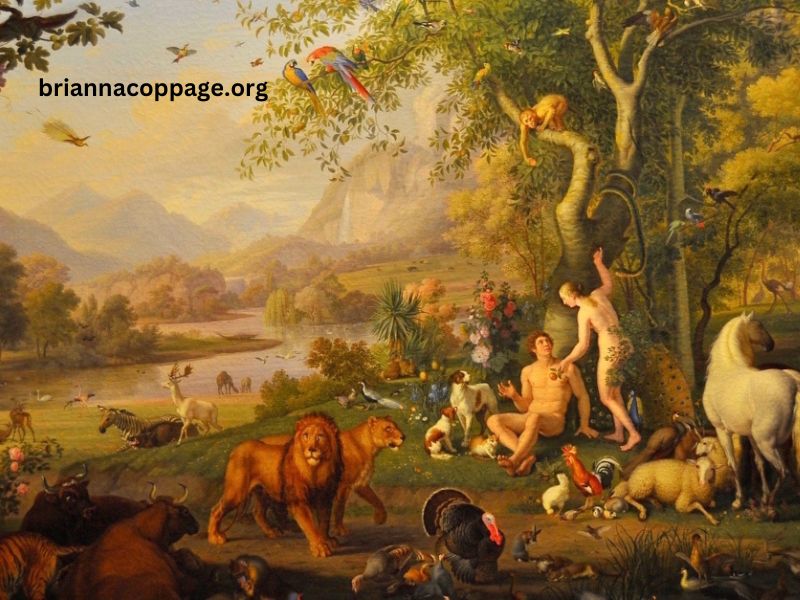The Garden of Eden has captivated the imagination of countless generations, serving as a symbol of paradise, innocence, and humanity’s original state of grace. Rooted in the biblical narrative, its exact location has sparked debates among theologians, historians, and archaeologists for centuries. This article delves into the various theories regarding the Garden of Eden’s location, examining scriptural clues, historical interpretations, and modern archaeological insights.
Biblical References
The primary source of information about the Garden of Eden is found in the Book of Genesis. According to Genesis 2:8-14, God planted a garden “eastward in Eden,” and from it flowed a river that divided into four branches: Pishon, Gihon, Tigris, and Euphrates. These rivers have been pivotal in attempts to pinpoint the Garden’s location, as they are recognizable geographic features in the ancient Near East.
The Four Rivers
- Pishon: Often associated with the region surrounding the Arabian Peninsula, Pishon is described as flowing around the land of Havilah, which is linked to gold and precious stones.
- Gihon: This river is frequently linked to the land of Cush, which could correspond to regions in modern-day Ethiopia or Sudan.
- Tigris: Known in antiquity, the Tigris flows through modern-day Iraq, running parallel to the Euphrates.
- Euphrates: The Euphrates is another well-known river that has been a cradle of civilization, flowing through present-day Turkey, Syria, and Iraq.
Interpretation Challenges
While the Tigris and Euphrates provide a concrete basis for location, the identification of Pishon and Gihon remains speculative. Various interpretations of the ancient texts have led to different geographical hypotheses, complicating the search for Eden.
Proposed Locations
The quest to locate the Garden of Eden has yielded several hypotheses, ranging from specific regions in the Middle East to more symbolic interpretations.
1. Mesopotamia: The Most Common Theory
The most widely accepted location for the Garden of Eden is in the region of Mesopotamia, particularly in the area between the Tigris and Euphrates rivers. This “Cradle of Civilization” is known for its rich soil, making it an ideal candidate for a bountiful garden.
Archaeological Evidence
Numerous archaeological sites, such as Uruk, Eridu, and Kish, provide insight into the life and culture of early Mesopotamian societies. Some researchers argue that these ancient cities could represent the essence of Eden—lush, fertile, and thriving with life.
2. The Armenian Highlands
Another theory posits that the Garden of Eden was located in the Armenian Highlands. Some scholars argue that the geographical descriptions of the four rivers could align with rivers originating from this mountainous region. The Kura and Aras rivers are often cited as candidates for Pishon and Gihon.
Cultural Significance
The Armenian Highlands are rich in cultural and historical significance, being home to some of the earliest known civilizations. This location suggests that the Garden of Eden could represent a more expansive, symbolic interpretation of a perfect state, rather than a specific geographical place.
3. The Persian Gulf Hypothesis
Some researchers suggest that the Garden of Eden was situated near the Persian Gulf, specifically in what is now submerged land due to rising sea levels. This theory posits that the ancient rivers flowed through a landscape that has since been lost to the sea, thus making the Garden’s location even more elusive.
Geological Evidence
Recent geological studies have indicated that ancient river systems may have existed in this area, providing potential support for this hypothesis. Submerged landscapes could indeed house remnants of early human civilization.
4. The Ethiopian Theory
Another compelling location is in modern-day Ethiopia, particularly along the Blue Nile. The Gihon river, identified with the Nile’s tributaries, along with the rich biodiversity of the region, lends credence to this theory.
Historical Connections
Ethiopia has been referred to as “Cush” in ancient texts, reinforcing connections to biblical references. The notion of a lush, fertile land aligns well with the Eden narrative.
5. A Symbolic Interpretation
In addition to geographical theories, some scholars propose that the Garden of Eden should be understood symbolically rather than literally. This view posits that Eden represents a state of harmony between humanity and God, rather than a specific physical location.
Spiritual Paradigm
From this perspective, Eden symbolizes an ideal existence characterized by peace, innocence, and unity with nature. This interpretation resonates across various religious traditions, emphasizing the universal quest for a “paradise” state in human experience.
Historical and Cultural Influences
The search for Eden has not only been a geographical endeavor but has also intertwined with historical and cultural narratives. Various cultures have their own versions of a “paradise,” reflecting humanity’s deep-rooted yearning for a utopian existence.
The Influence of Zoroastrianism
Ancient Zoroastrian texts mention a paradise called “Wahraman,” which bears similarities to the biblical Eden. This cultural interplay illustrates how the concept of a perfect garden transcends individual religious traditions and resonates within the broader human experience.
The Epic of Gilgamesh
Interestingly, the Mesopotamian “Epic of Gilgamesh” features a garden reminiscent of Eden, where the hero seeks immortality. This narrative, alongside biblical texts, emphasizes the universal themes of loss, longing, and the quest for a return to paradise.
Theological Perspectives
The Garden of Eden is not only a historical and geographical puzzle but also a theological one. Different religious traditions offer varying interpretations of its significance.
Jewish Perspective
In Judaism, the Garden of Eden is often seen as a representation of the ideal relationship between God and humanity. The concept of “Gan Eden” encompasses both the physical garden and a spiritual state of bliss.
Christian Theology
In Christian thought, the Garden of Eden is pivotal for understanding the Fall of Man. It symbolizes humanity’s original state of grace, lost due to disobedience. This narrative underpins the Christian theme of redemption and the promise of a restored paradise in the afterlife.
Islamic Interpretation
In Islam, the Garden of Eden (Jannah) holds immense significance, representing both a physical and spiritual realm. The Quran recounts the story of Adam and Eve, underscoring the themes of temptation, forgiveness, and divine mercy.
Conclusion
The quest to locate the Garden of Eden remains one of history’s most intriguing mysteries. Whether situated in Mesopotamia, the Armenian Highlands, or represented as a symbol of humanity’s lost innocence, Eden continues to inspire exploration and reflection.
Ultimately, the Garden of Eden serves as more than a geographical location; it represents humanity’s eternal longing for a state of peace, harmony, and unity with the divine. As we explore its many interpretations and potential locations, we engage not only with the past but with the timeless human experience of searching for paradise. The Garden of Eden may be elusive in physical terms, but its essence persists in our collective imagination, echoing our desires for a better world.






